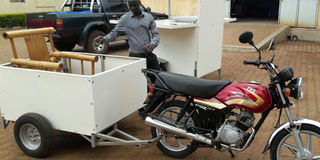Student innovation to rescue rural women

Jimmy Onyang shows off the multipurpose cart that they designed carry a variety of goods. Photos by Stephen Otage
What you need to know:
- Concerned about the long distances people in rural areas move carrying goods on their heads, Jimmy Onyang and Ben Lokeris have invented several carts that can be hooked onto a boda boda to transport goods easily.
After realising that the easiest and common means of transport in his village is the boda boda because of the terrain, Jimmy Onyang, 25, thought it was about time to innovate a more convenient means. Onyang who hails from Nabilatuk village in Nakapiripirit District, said very often women in his village trek for long distances carrying goods and water on their head.
The mechanical engineering student at Lugogo Vocational School in Nakawa division, discussed with his elder brother Ben Koriang Lokeris, also a mechanical engineer, on how they could use the boda boda to reduce the burden of human beings using heads to carry cargo.
Lokeris searched the internet and got an idea of fabricating an item from aluminum pipes. He chose aluminum because it is light. He then made the designs he had in the mind which he gave Onyang to weld into a cart with an adaptor. The cart is hooked onto a motorcycle and loaded with goods for easy movement.
To address the challenge of women carrying water on their heads, they mounted a 1,000-litre water tank onto the cart but filled with water, and discovered that the motorcycle engine capacity could not carry it but could carry half of it.
Soaring higher
Their concept has opened opportunities for them. Uganda Industrial Research Institute (UIRI) is already incubating it for commercial use. Besides providing water for domestic use only, their invention can be used to promote irrigation because it can take water to the garden using a motorcycle.
Other the cart for goods, the duo also has designed carts in shape of beds that can be used in remote villages to transport patients to hospitals.
In addition to this they have designed mobile shops, to address the needs of traders who have to move from market to market selling their merchandise. The mobile shops have shelves where goods are permanently stashed. The trader just needs to open the windows and display the goods.
Future prospects
Other than the mobile shop, Lokeris says they are designing are a mobile kitchen. The mobile kitchen will contain a gas cylinder, a working surface, a pantry for drying utensils, a cooking area, a cupboard for storing utensils as well as stores to store the food for mobile food vendors.
The duo is planning how to add solar panels onto the carts just in case their use extends into the night. Their other innovation is the multipurpose cart, which can be used to carry any kind of cargo.
Government nods
Ideas such as these with a ripple effect on society are among the innovations for which government has set aside Shs43 billion to support the innovators scale up production.
While addressing scientists during a science, research and innovations retreat at UIRI, Prof Charles Kwesiga, the UIRI executive director, said universities need to start taking career guidance seriously because that is how you are able to identify individual competences so as to nurture and develop them.
He told journalists that many Ugandans have innovations, which have not been developed further because of lack of proper funding infrastructure to fund research.
He cited Samuel Mugarura, the Makerere University student, who invented teargas saying whereas people think it is a reserve for the police, teargas is a defensive form of technology which can be used to demobilise rapists without killing them, help in the arrest of thieves, or disperse animals which invade villages because it is environmentally friendly and less toxic. According to Lokeris, they are currently looking for market for their carts, which go for Shs4 million each.
Fund for innovators
To access the funds for innovations, people with innovative ideas have to register with the Uganda Industrial Research Institute or Uganda National Council for Science and Technology where their innovations will be vetted to see if they qualify for funding.




